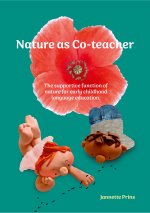
Nature as Co-teacher - The supportive function of nature for early childhood language education
Omschrijving
This dissertation is focused on the supportive function of nature for children’s language development in early childhood education. Can flowers speak or herbs be polite? In the poem, the poet Guido Gezelle (1860) attributed linguistic quality to nature. However, not only poets sense the linguistic quality of nature and Dennis’ story illustrates this as well:
Dennis is a three-year-old, who attends preschool for three days a week. Each day he and his classmates spend an hour outdoors, playing on the playground of the school. The playground has nice equipment, including a bird nest swing, a slide and a climbing structure, offering all kinds of play affordances. Most of the time the teacher also brings out the bikes, giving the children even more play opportunities. On some days the teacher chooses to go to the green nook of the playground. It is a smaller area with a woodchip floor, small trees and shrubs and a small bush tunnel. Dennis prefers playing outdoors over playing in the classroom. Outdoors he can let off steam, releasing energy. And releasing energy he does; he is running around the playground. Surprisingly, he does not touch any of the play sets and he is screaming so loudly that his teacher and classmates often ask him to be quiet. The sound of his voice is reflected by the concrete tiles and the walls that surround the playground. However, in this hollering he does not speak any word. The next day Dennis and his classmates go to the small green nook of the playground. Dennis sneaks through the bush tunnel, again and again. He looks around, walks carefully, and speaks with a soft voice. He’s guiding his steps with some words: ‘what’s this, I walk through, walk through, wow this is scary.’ Going underneath a hawthorn bush, he speaks to the hawthorn berries: ‘Oh look, there, there you are strawberries.’ He picks some of the berries, shows them to a classmate, and says: ‘these are for the bird, I think the birds like them, like them, mmmmmjam the birds.’
Rationale for the current dissertation
The story of Dennis shows how two different play environments create (almost) two different children: one totally overwhelmed by the schoolyard’s sounds and affordances, screaming with a raw voice not using a single word, and one whose attention is drawn by the green surroundings and its affordances, talking softly to himself and his friends and to nature, while exploring the environment and asking questions about his findings. This striking observation raises the question: can nature support language development in early childhood education?
